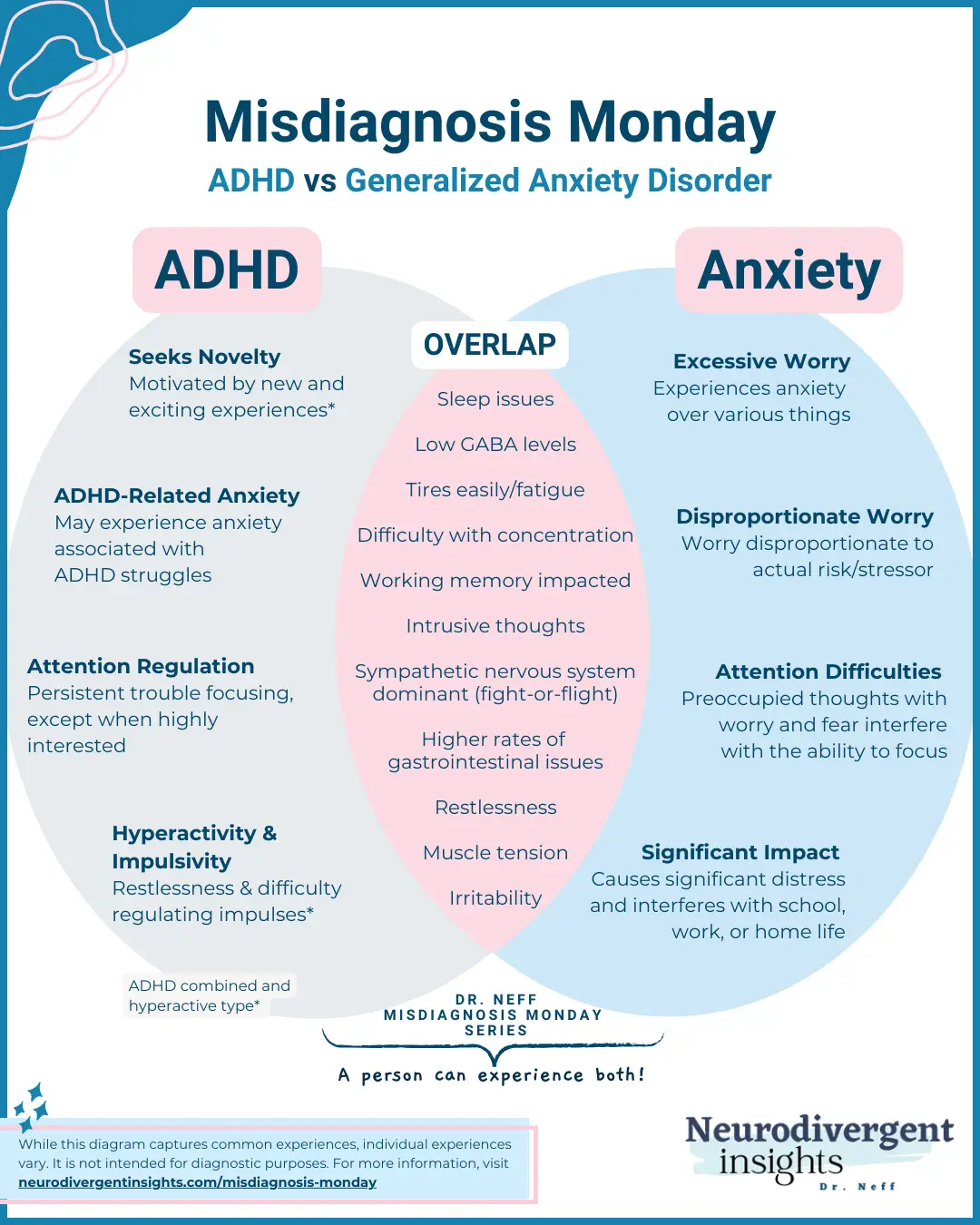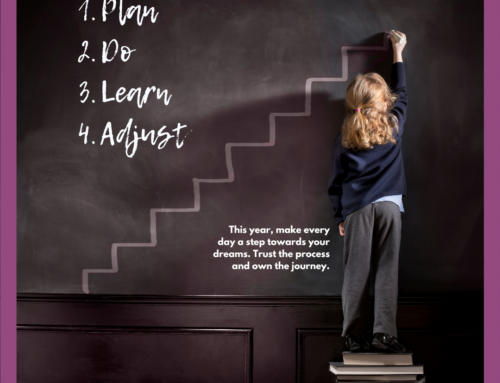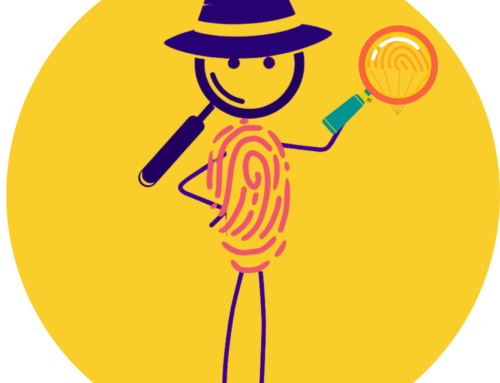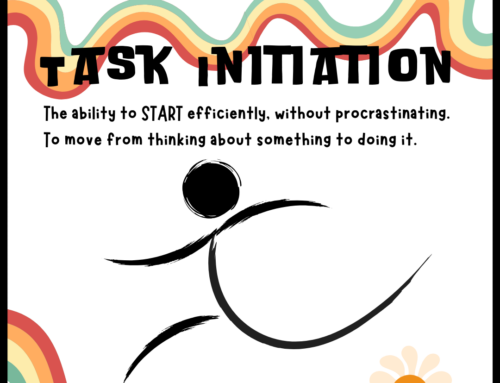Image Credit: Neurodivergent Insights, Dr. Neff
Understanding the Link Between ADHD and Anxiety
Ever wonder why ADHD and anxiety seem to show up together so often? About half of adults with ADHD also experience some form of anxiety disorder. While these two conditions can overlap and even intensify each other, they’re not the same. Understanding the differences (and similarities) can be a game-changer for managing your mental health.
Let’s break down the connections, and then explore the unique flavors of anxiety: generalized anxiety, social anxiety, and the kind of anxiety that’s woven into the ADHD experience.
ADHD and Anxiety: Why the Overlap?
ADHD is known for symptoms like inattention, impulsivity, and hyperactivity. Anxiety, on the other hand, is all about persistent worry and fear. When they occur together, they can make each other worse. For example, the stress of managing ADHD symptoms—like missing deadlines or forgetting appointments—can lead to feelings of anxiety and even a sense of failure. And when anxiety is present, it can make it even harder to focus, organize, or complete tasks.
It can become a vicious cycle: ADHD creates situations that fuel anxiety, and anxiety makes ADHD symptoms harder to manage.
Differentiating the Types of Anxiety
Not all anxiety is created equal. Here’s how to tell the difference between generalized anxiety, social anxiety, and ADHD-related anxiety:
Generalized Anxiety Disorder (GAD)
- What it feels like: Persistent, excessive worry about a wide range of everyday things—work, school, health, family, finances, and more.
- Symptoms: Restlessness, fatigue, irritability, trouble sleeping, and difficulty controlling the worry35.
How it overlaps with ADHD: People with ADHD may develop GAD because the unpredictability and “consistent inconsistency” of ADHD life can make the world feel overwhelming and uncontrollable. However, GAD worries aren’t just about ADHD struggles—they’re broad and often about many unrelated topics.
Social Anxiety Disorder (SAD)
- What it feels like: Intense fear of being judged, embarrassed, or negatively evaluated in social or performance situations.
- Symptoms: Blushing, sweating, trembling, nausea, fast heartbeat, and avoidance of social situations.
How it overlaps with ADHD: While ADHD can cause social slip-ups (like blurting things out or missing social cues), social anxiety is specifically about the fear of social judgment. Someone with ADHD might avoid a presentation because they fear being unprepared, but someone with SAD avoids it because they fear public scrutiny3.
ADHD-Related Anxiety
- What it feels like: Worry and stress directly tied to ADHD symptoms—like being late, forgetting things, or struggling to finish tasks.
- Symptoms: Feeling overwhelmed, anxious about performance, and stressed about meeting expectations4.
How it’s different: This anxiety is situational and often disappears when ADHD symptoms are managed well. It’s less about a broad sense of worry (like GAD) or fear of social situations (like SAD), and more about the day-to-day challenges of living with ADHD14.
Why Does It Matter?
Understanding which type of anxiety you’re experiencing is crucial because it guides treatment. For example, ADHD-related anxiety might improve with better ADHD management, while GAD or SAD may require therapy, medication, or specialized strategies145.
If you’re struggling to tell the difference, ask yourself:
- Are my worries mostly about my ADHD challenges, or do they extend to all areas of life?
- Do I feel anxious mainly in social situations, or is it more constant?
- Does my anxiety get better when my ADHD is under control?
- Talking to a mental health professional can help you untangle these threads and find the right support.
Building a Toolkit: Managing Both ADHD and Anxiety
Here are some strategies that can help, no matter where your anxiety comes from:
- Cognitive Behavioral Therapy (CBT): Effective for both ADHD and anxiety disorders.
- Mindfulness and Relaxation: Techniques like meditation and deep breathing can calm the mind and body.
- Medication: Some medications can target both ADHD and anxiety, but it’s important to work with your doctor to find what’s right for you1.
- Routine and Organization: Creating structure can reduce uncertainty and help manage both ADHD and anxiety symptoms.
Final Thoughts
Living with symptoms of ADHD and anxiety can feel like a double whammy, but understanding the differences between generalized anxiety, social anxiety, and ADHD-related anxiety can empower you to seek the right help and build strategies that truly work. Remember, you’re not alone—and with the right tools and support, it’s absolutely possible to thrive.
Mel Robbins’s Spotify Podcast The Truth About Anxiety & ADHD: Life-Changing Tools From a Renowned Psychiatrist,” featuring Dr. Tracey Marks, MD, a psychiatrist who specializes in anxiety and ADHD, illuminates the complicated world of navigating ADHD and Anxiety and tools that can help.
If you have questions or want to share your own experiences, drop a comment below. Your story could help someone else feel seen and supported!







